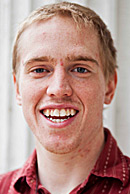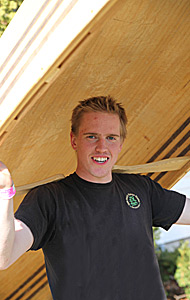Unabashed nature enthusiast Will Meadows speaks of canoes in near reverential tones. In his mind, canoes are as centric to the ecosystem as a bird’s nest or a beaver dam.
“Canoes represent the coexistence of creativity and nature,” says the Lawrence University senior. “They lie at the intersection of human ingenuity and place, vessels for exploration, artistic expression and sustenance.”

Beginning in August, Meadows will spend a year immersing himself in canoe-building communities across five distinct environmental regions of the world as a 2012 Watson Fellow.
Meadows, an environmental studies major from Cincinnati, Ohio, was one of 40 undergraduates nationally awarded a $25,000 fellowship from the Rhode Island-based Thomas J. Watson Foundation for a year of independent travel and exploration outside the United States on a topic of the student’s choosing.
His proposal —”Humanity’s Vessel: The Art and Ecology of Canoes” — was selected from among 147 finalists representing 40 of the nation’s premier private liberal arts colleges and universities. More than 700 students applied for this year’s Watson Fellowship.
For much of his still-young life, Meadows has used canoes and rivers for his method and means of exploring the world, whether it was the Chao Phraya River in Thailand, the Jong River in Sierra Leone, the Rogue River in Oregon or the Boundary Waters Wilderness and Canoe Area in northern Minnesota.
“I would often escape to the river after school, looking for my true education,” said Meadows, who is spending his spring break on a 100-mile canoe trip down the Buffalo River in Arkansas. “In every way, rivers have been my teachers, my schools. Rivers define me. Moving steadily in a canoe is my natural experience.”
First Stop Lake Titicaca
Meadows will begin his “wanderjahr” at Lake Titicaca, on the border of Bolivia and Peru, working with the indigenous Uros peoples, who build reed canoes. There he also hopes to use his talents as a sculpture artist to create beautifully intricate reed dragon headed vessels with the Uros.
Next fall he will travel to the Solomon Islands, immersing himself in the ocean voyaging Polynesian canoe culture.
“I want to explore the art of the open-ocean canoe and the issues affecting the people of the sea as the struggle continues to preserve ancient voyaging knowledge and artisanship.”
On Tanzania’s ocean island of Zanzibar, Meadows will help construct outrigger dugout canoes and sail among Tanzania’s native fishing communities while studying the ecological issues affecting these peoples.
“My academic background in the environmental sciences as well as my professional experiences in sustainable agriculture, forestry, water and land management, will help me explore the conservation issues affecting the canoe-building natives,” said Meadows, who has been active in Lawrence’s on-campus sustainable garden and instrumental in the establishment of an on-campus orchard.
The diverse designs of North American native bark canoes will be Meadows’ focus for two months beginning in April 2013. Using Toronto as his base, Meadows will work with two world-renowned canoe builders, Rick Nash and Pinnock Smith of the Algonquin First Nation.
Meadows concludes his fellowship next summer in northern Norway with an apprenticeship in skin and canvas boat building with Anders Thygesen, founder of Kajakkspesialisten (the kayak specialist), a company renowned for its work in building traditional skin-on-frame sea kayaks and traditional paddles.
“As the final location in my journey,” said Meadows, “Kajakspecialisten will be a place to really consider what my role will be in this world after the Watson experience.”
An “ideal Watson Fellow”
Brian Pertl, dean of the conservatory of music and Lawrence’s campus liaison to the Watson Foundation, described Meadows as “an ideal Watson Fellow.”
“Will’s proposed canoe-building odyssey perfectly channels his deepest passion into an immersive multi-cultural experience,” said Pertl. “His endless curiosity, love of life and affable nature will make him an ideal ambassador for this most prestigious of fellowships. I am so excited for his success and can’t wait to see how this year changes his life.”
 Over the course of the past year and a half, Meadows and a four-person crew, with help from the father of Lawrence geologist Marcia Bjornerud, constructed a 16-foot pine and walnut strip canoe on campus — a project he described as “the most meaningful and enveloping of my life. When she finally rode the water for the first time, I remember lying on my back looking at the sky from her seatless belly, and the border between river, canoe and person faded with the setting sun.”
Over the course of the past year and a half, Meadows and a four-person crew, with help from the father of Lawrence geologist Marcia Bjornerud, constructed a 16-foot pine and walnut strip canoe on campus — a project he described as “the most meaningful and enveloping of my life. When she finally rode the water for the first time, I remember lying on my back looking at the sky from her seatless belly, and the border between river, canoe and person faded with the setting sun.”
According to Meadows, his Watson proposal is in many ways a paradoxical project.
“A global comparison of handcrafted vessels hasn’t been thoroughly conducted, so in that way this is a new and cutting edge idea. But it’s also the desire to transfer knowledge of some of the oldest practices of humankind. I might be one of the only people with the chance to learn techniques in all these diverse world canoe styles. This is an opportunity to find new meaning at the crossroads of all my passions, including writing, ecology, art, people and exploration. I can’t wait to dive in and challenge myself to the absolutely fullest during my Watson year.
“I encourage everyone to ask themselves the question, ‘what is my ultimate passion?,'” Meadows added. “Putting this proposal together has helped me answer that question, but more importantly it showed me the beauty in other people’s passions. What’s your Watson?”
Meadows is the 68th Lawrence student awarded a Watson Fellowship since the program’s inception in 1969. It was established by the children of Thomas J. Watson, Sr., the founder of International Business Machines Corp., and his wife, Jeannette, to honor their parents’ long-standing interest in education and world affairs.
Watson Fellows are selected on the basis of the nominee’s character, academic record, leadership potential, willingness to delve into another culture and the personal significance of the project proposal. Since its founding, nearly 2,600 fellowships have been awarded.
About Lawrence University
Founded in 1847, Lawrence University uniquely integrates a college of liberal arts and sciences with a world-class conservatory of music, both devoted exclusively to undergraduate education. Ranked among America’s best colleges by Forbes, it was selected for inclusion in the book “Colleges That Change Lives: 40 Schools That Will Change the Way You Think About College.” Individualized learning, the development of multiple interests and community engagement are central to the Lawrence experience. Lawrence draws its 1,445 students from 44 states and 35 countries. Follow us on Facebook.